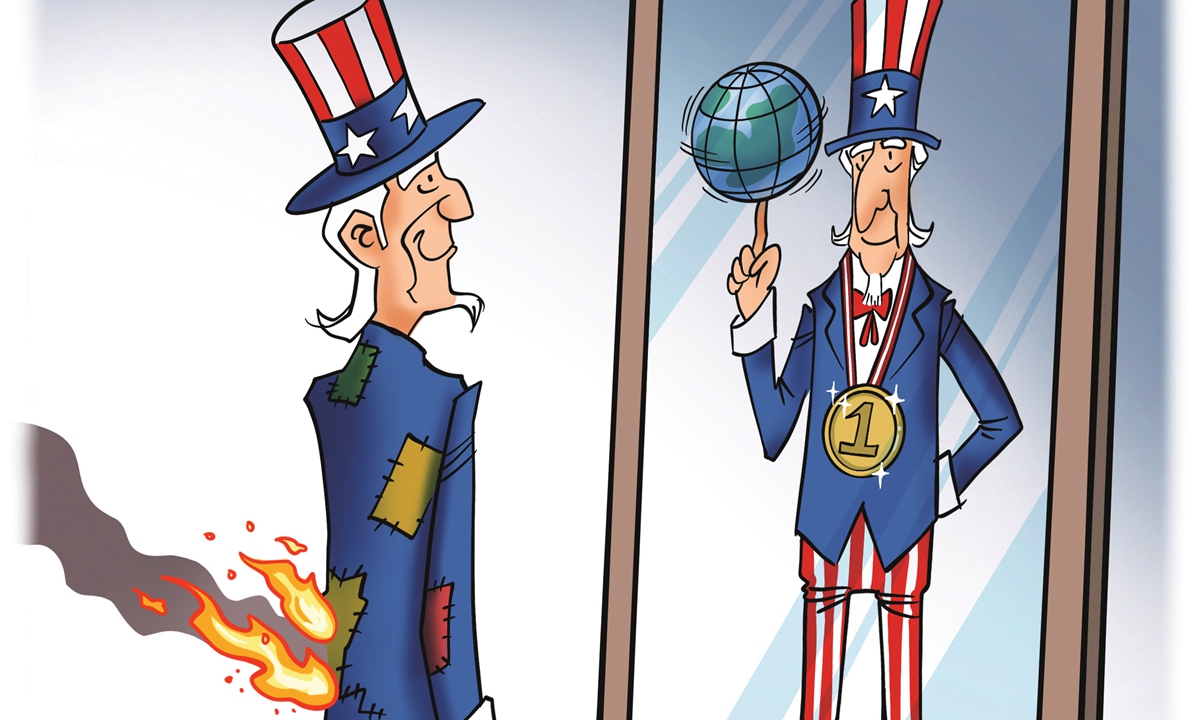
Illustration: Liu Rui/GT
The Russia-Ukraine conflict is reaching a turning point, the same is the case for US policy. US President Joe Biden will visit Poland from February 20 to 22 to mark the one-year anniversary of conflict, the White House confirmed on Friday. Yet no matter how noble the US side portrays the visit, it can hardly change the fact that Washington's proxy war strategy is caught in a predicament.
John Kirby, a White House spokesperson, said Biden would send a message of continued US support for Ukraine's efforts. This is same old cliché about keeping morale high. But Kirby also noted, "He wants to talk about the importance of the international community's resolve and unity in supporting Ukraine for now going on a year." This sounds more realistic.
It remains to be seen what the specific purpose and motivation is behind Biden's trip. It depends on his rhetoric and on the ground meetings. Still, one thing cannot be overlooked - US' position in the conflict is becoming increasingly complicated. So far, Washington has profited from the crisis. But a watershed is emerging, Shen Yi, a professor at Fudan University, told the Global Times.
The West has exaggerated Russia's strategic ambitions too hard. They keep saying that Russia is failing in Ukraine, failing in reaching its goals. The truth is, Russia's strategic targets have basically been achieved, Lü Xiang, research fellow at the Chinese Academy of Social Sciences, told the Global Times.
Russia has established a stable front in the east of the Dnieper River, and they can now launch not only counterstrike but also small-scale attacks westward. On the other hand, Ukraine has no independent defense capability at all, it is 100 percent reliant on assistance from the US and NATO, Lü added.
That being said, the conflict is turning into a rabbit hole for the US. How much the US will be willing to offer, and how much will the US gain in return? Will Washington's military assistance be self-serving or self-hurting? The tides are shifting on this question.
On the battlefield, Ukraine has been difficult to push Russia back. Beyond the battlefield, Ukraine is going through a slew of high-level dismissals, with large numbers of young people, elites and talent leaving their homeland, observers said.
The US posture is looking increasingly incoherent in terms of policy-making regarding Russia-Ukraine conflict. As it has set a rather high anti-Russia tone in domestic politics, the US has been left with little room for making geopolitical compromise.
Analysts believe that Russia can survive a war of attrition, which has instead "left the NATO countries virtually defenseless, having emptied their own inventories to supply Ukraine," according to George Galloway, a six-term British parliamentarian, in remarks made during an interview with Global Times.
While Washington has talked a lot about international solidarity, it is making efforts to withdraw itself. The US has in fact wanted Poland to instigate EU and play a bigger role, replacing the US.
One year on, the US, the initiator of the Russia-Ukraine conflict, has started to waver, as it doubts whether the political pressure is too big for Ukrainian President Volodymyr Zelensky to bear and the continuous plight it stuck itself in.
Supply of more advanced weaponry will further provoke Russia and risk expanding the war. If the Russia-Ukraine war spills over, the first to suffer will be Poland and Romania, two NATO members under the protection of NATO's Article 5 collective defense obligation. By that time, the US and NATO will confront with truly policy-making dilemma, because the impact to the world will be 100 times more severe than the original war that started on February 24 last year, Lü said.
In March 2022, Biden visited the Polish border Rzeszow and had pizza with US troops stationed there. That was all about making a show. On year later, for the US president, the show must go on, whatever the case is. Observers are speculating whether Biden will meet Zelensky in Poland, and whether he may make a stop-by in Ukraine. Those scenarios, should they unfold, only carry symbolic significance.
Today, the US wants both cutting loss in time, and putting on a good show. As to which takes priority, that remains an open question.
The author is a reporter with Global Times. opinion@globaltimes.com.cn




